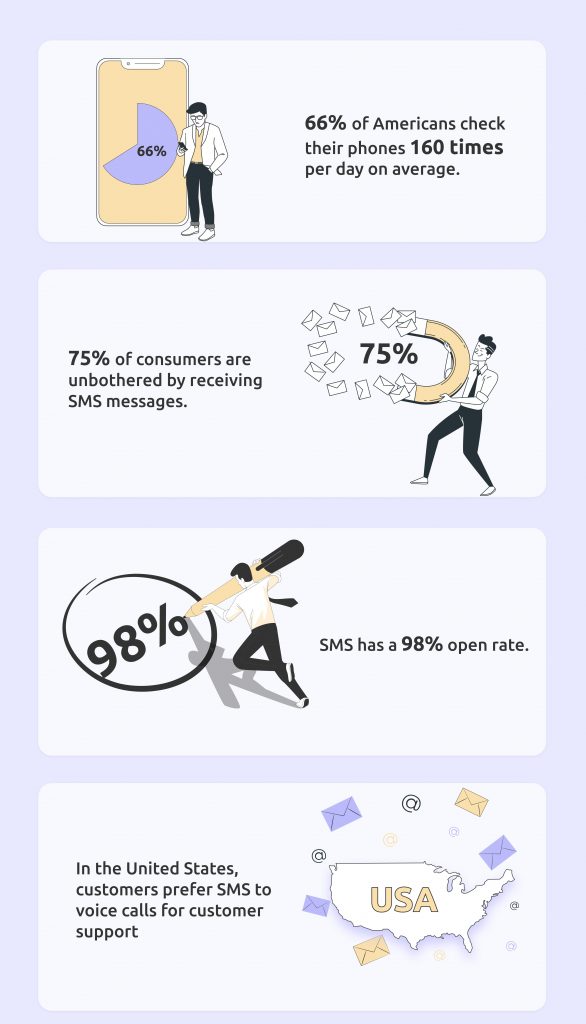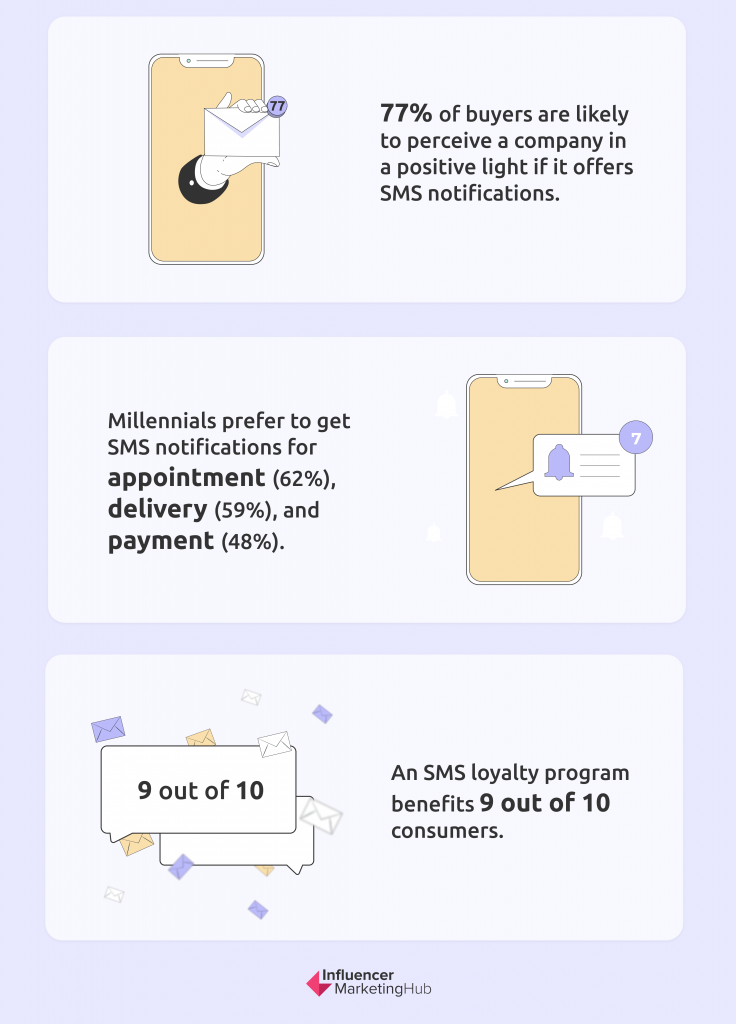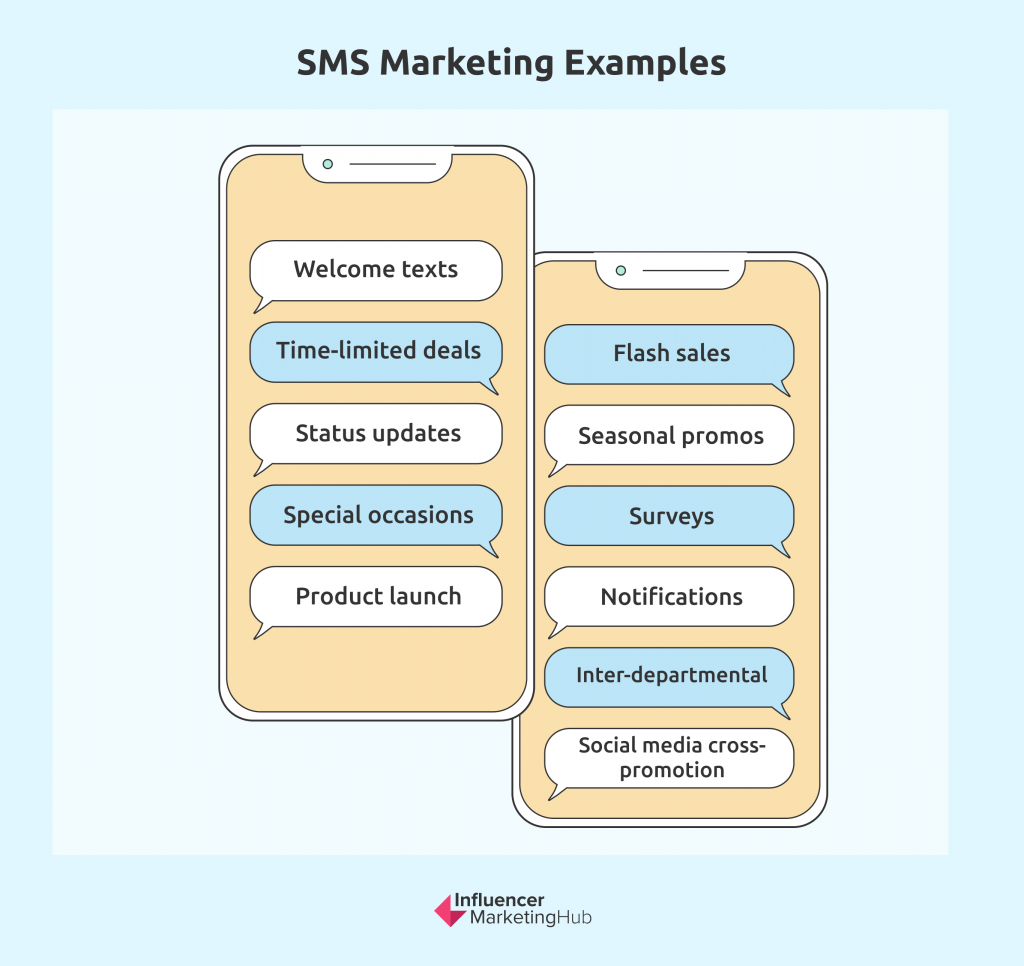When done effectively, SMS marketing is one of the most effective ways to engage customers and prospects.
Let’s look at these numbers:


- 66% of Americans check their phones 160 times per day on average.
- 75% of consumers are unbothered by receiving SMS messages as long as they've given consent.
- Higher than that of email marketing, SMS has a 98% open rate.
- In the United States, customers prefer SMS to voice calls for customer support
- 77% of buyers are likely to perceive a company in a positive light if it offers SMS notifications.
- Millennials prefer to get SMS notifications for appointment (62%), delivery (59%), and payment (48%).
- An SMS loyalty program benefits 9 out of 10 consumers.
With these stats in mind, it's more crucial than ever for businesses to use SMS marketing.
What is SMS Marketing and Why Your Company Needs It:
SMS Marketing Explained

SMS stands for “short message service,” also known as “text messaging.” SMS marketing allows businesses to interact with customers or subscribers via text messages. The content comes in various forms, but they all have the same purpose: to promote your business.
Marketers can only send text messages to those who have agreed to receive them. There are government bodies that ensure and regulate the admissibility of SMS marketing:
- The Federal Communications Commission (FCC)
Before sending text messages to clients, review the FCC's strict message distribution and consent restrictions.
- The Telephone Consumer Protection Act (TCPA)
The TCPA protects consumers from unwanted mass text messages.
- The Cellular Telecommunications Industry Association (CTIA)
The CTIA is a trade association that provides instructions and recommendations on SMS marketing.
In terms of marketing costs, marketers will be charged in advance rather than receive a bill after sending bulk text messages. For example, you can buy SMS credits worth $100 and use them as you see fit. You can purchase more when you run out of credits. Just keep in mind that the price per SMS varies in the country you're sending the text messages.
SMS Marketing Examples
Businesses can use text messaging for a variety of marketing reasons, including:
-
Welcome texts
A welcome SMS is similar to sending a welcome email when a customer signs up for your loyalty program. You can give new registrants a discount to encourage them to buy again.
-
Time-limited deals
If you're running a special campaign and want to maximize customer engagement, SMS is the way to go. Incorporate a sense of urgency into your sales and ad wording.
-
Status updates
SMS is outstanding for order confirmation, delivery updates, and tracking information.
-
Customer care
SMS marketing can address an issue before it becomes a huge problem. For example, a simple text message can reassure customers who are experiencing shipping delays. A personal explanation via SMS shows the brand's human side.
-
Special occasions
Show your customers how much you value their business. Remember key events like their birthday or anniversary. To make it even special, offer them birthday discounts or anniversary incentives.
-
Product launch
Send an SMS campaign to let customers know about new arrivals. This is a great technique for driving traffic and interest toward new items.
-
Flash sales
Flash discounts are a great way to say thanks to loyal customers for their trust in your business. Inform them about limited-time, SMS-exclusive deals.
-
Seasonal promos
When it's time to clear out your inventory, text your customers to remind them of your seasonal bargains.
-
Surveys
Surveys are a great way to learn about your customers' needs. Try delivering a survey link through SMS instead of other marketing programs to enhance response rates.
-
Notifications
Sending SMS reminders helps companies to approach customers with confidence. These reminders go beyond sales promotions. They include appointment alerts, payment notices, and valuable info on health services and weather updates.
-
Inter-departmental
Today's businesses rely on SMS to deliver vital information to keep employees informed of company performance and facilitate teamwork.
-
Social media cross-promotion
Encourage your SMS subscribers to follow you on social media channels. Adding a social media reward can help sway customers to do so.
SMS Marketing at Work
Text message marketing relies on a database with your clients' names, contact details, demographics, and other relevant data. Your customer's consent to receive marketing offers is included in this database.
Consumers can give their permission to be a subscriber over the phone, in person, or online. The simplest way to do so is to text a five to a six-digit keyword or a “short code.” The short code often comes from your telecommunication provider, so you must put your business name on every message for recognition.

Source: dirms.com
There are two types of SMS marketing messages:
- Campaigns
These are "one-to-many" mass texts. They are commonly used to promote (coupons, bargains, etc.) or inform (events, updates, etc.) subscribers.
- Transactional
These are "one-to-one" messages like order confirmation and delivery notification. Most of the time, transactional messages are personalized. They also update clients in real-time.
So, how can you send bulk messages without messing them up or make sure that the right type of marketing message is sent to the correct subscribers? The solution is automation, which enables businesses to track hundreds of text message subscribers.
Automation also helps execute high-quality SMS marketing campaigns with a high ROI. You can use an SMS marketing software or app for automation. The tool allows you to tailor your messages and send them to your entire database in mere seconds.
Many SMS software programs work well with other marketing solutions, particularly with Customer Relationship Management (CRM). Your SMS marketing software may share data with your CRM. This type of connectivity lets you sync your contacts from your CRM to your SMS marketing program, saving time and boosting your sales and marketing efforts.
SMS Marketing Benefits
As the world faces unprecedented challenges, SMS marketing isn't simply for promoting a product or service. It has also become a vital communication tool because you can send messages even without an internet connection.
Here are some ways your business can profit from SMS marketing activities:
-
Direct communication
SMS is one of the fastest communication channels available, with a read rate of 97% within 15 minutes after delivery. When combined with other popular marketing campaigns like email and social media, SMS ads provide a successful ROI of over 50%.
-
Convenience
Using a shortcode or keyword in print ads, promo boards, and social media provides a convenient way for your clients to subscribe. This method encourages customers who recognize a brand's shortcode to interact and respond quickly.
-
Channel integration
SMS is a great standalone medium, but it can also support other marketing channels like social media and email. SMS marketing can urge clients to read an earlier email from the brand. A “Have you seen our email?” text message can increase email open rates by up to 30%.
-
Brand loyalty
Well-planned bulk texts increase customer engagement and brand loyalty. Customers don't want to read generic or unnecessary content, so you must target them with tailor-made offers.
-
Brand recognition
According to research, 45% of customers respond to SMS blasts from popular brands. Startups can leverage SMS marketing to build brand awareness.
-
Data collection
An SMS survey is completed by around 31% of those who get it. Client feedback is a great way to learn about how your brand functions on a digital scale.
-
Local customer engagement
Many people are now used to texting when engaging with local businesses such as dentists, hairdressers, and garages.
-
Response data
Measuring meaningful ROI, identifying clients engaged via text message, and tracking delivery rates are possible via SMS. Companies can use this data to target their ads better and understand their mobile audience.
SMS Marketing for Specific Industries
Text messaging can be a great way to supplement your digital marketing efforts. They play a unique role in providing vital information securely and proficiently. It helps companies to thrive. However, certain businesses need SMS marketing to survive:
-
eCommerce shops
You can easily send advertising materials, order and shipment notices, and more via SMS.
-
Travel agencies
Travelers need real-time information such as flight updates, gate changes, cancellations, and weather forecasts. With SMS, you can notify customers of exactly what they need to know without worrying about delivery.
-
Appointment-based organizations
Reminding your clients through SMS guarantees they never miss another appointment. This will save you time and money wasted on no-shows and latecomers.
-
Large companies with over 100 employees
Internal communication is critical, yet communicating with everyone in a large business is tricky. Email is too slow for important issues. Using SMS for internal communication ensures that all employees get the information they need at the right time.
SMS Marketing Best Practices
Because consumers receive tons of notifications throughout the day, it's vital to get your text message right the first time.
-
Seek consent
SMS marketing uses the same opt-in criteria as email marketing. Before sending messages, marketers must get express authorization from consumers. Every SMS message must also include an opt-out like a “reply STOP to discontinue” or an unsubscribe link (particularly for non-US and Canadian subscribers).
-
- The critical issue here is maintaining authorization. Start with full disclosure. Let your subscribers know what to expect from your messages. Don't abuse your privilege. SMS marketing is suited for time-sensitive content. Excessive usage may drive customers away.
-
Keep your messages brief and to the point
There is no room for rambling in SMS marketing because there is a 160-character limit for text messages. The content of your text message must be short and straightforward. A tried-and-tested formula is to capture their attention, communicate your message, and close it with a Call-to-Action. Here's an example of a restaurant reminding customers of trivia night via SMS:

Source: textline.com
It's also important to identify yourself on the get-go so your subscribers know who you are and understand your message. Also, use proper grammar. Avoid using text lingo and abbreviations since they are not generally understood. Use correct capitalization and punctuation. Failing to do so results in an unprofessional-looking message.
-
Send messages at a reasonable time
People check emails a couple of times a day (at most), but they open text messages practically as soon as they receive them. This is great for urgent communications, but don't exploit it by sending texts at ungodly hours. Even your most loyal customer wouldn't want to receive a sale reminder at 3 a.m.
Some countries even have regulations about SMS marketing schedules. In France, the government prohibits marketers from sending SMS messages on Sundays, during holidays, or after 10 p.m.
-
Don’t bombard subscribers with messages
As much as you’d like to inform your target market about every sale or deal your business runs, control yourself. Consumers may find it difficult to ignore text alerts like the way they can disregard ad billboards. But when they receive one too many SMS promos, they won’t hesitate to discontinue their subscription, or worse, cancel your brand.
-
Use SMS marketing tools
SMS marketing software can help you improve your marketing efforts. Most notably, it can automate and deliver several messages at once. A program can also give you important metrics and reports to help you assess the exact impact of your campaign. With this information, you can optimize your text advertising and experiment with different approaches to improve your ROI.
-
Leverage SMS marketing to boost your overall marketing plan
A marketing strategy designed specifically for sending SMS messages works well on targeting your audience. But your marketing efforts will be much easier—and more effective—if you can manage many channels from one command post. As such, SMS marketing should be part of your overall marketing strategy.
The most direct way to integrate SMS with your entire marketing campaign is through email marketing. SMS and email are platforms that work in tandem. You may design campaigns that employ both systems, such as email for detailed content and SMS for urgent information. These integrated channels result in a marketing communication system that enables your business to gain a wider reach.
Bottom Line
A well-planned and run SMS marketing campaign can help your business grow and improve customer engagement. In addition to promoting your products and services, this can boost brand awareness, build brand loyalty, and potentially generate sales. As SMS marketing becomes more popular, it's vital not to miss out on what can be a highly efficient way to communicate with your customers.


